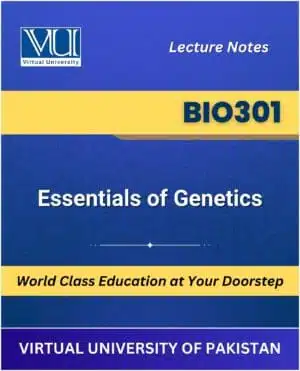BIO201 – Cell Biology Book
₨ 900
Purchase the BIO201 – Cell Biology book from VU Bookshop Online. This book provides an in-depth study of the structure and functions of cells, the building blocks of life. It is an essential resource for understanding cellular processes and mechanisms. Doorstep delivery available!
BION201—Cell Biology book is very important to students undertaking the course on Cell Biology at Virtual University. The book basically helps in the detailed study of a cell, which acts as the basic structural and functional unit of life. This will, therefore, be able to equip students with enough knowledge concerning the structure and functions of a cell and all processes occurring inside the cell.
The BIO201 course will therefore commence with covering the basic cell structure and the constituent parts: nucleus, cytoplasm, organelles, and cell membrane. Explaining the mode of performance of various cellular organelles like mitochondria, endoplasmic reticulum, Golgi apparatus, and ribosomes, with reference to each in relation to the way the cell works as a unit, is partly provided in the detail of this book.
Another major component of the BIO201-Cell Biology book deals with cell division. The learners would be exposed to two types of cell division: mitosis and meiosis, which respectively control growth and development and reproduction. This describes the phases of these processes, the role of genetic material replication, and how mistakes during cell division cause diseases like cancer.
It is in the BIO201 book that learners get to learn about the mechanisms of cell signaling and how cells talk to each other. The learners shall be able to learn different pathways in signaling, like hormonal signaling, neurotransmission, and growth factor signaling. Cell signaling is an important area toward understanding how cells can coordinate their functions and react to changes in their environment.
The BIO201-Cell Biology book also includes how substances move across the cell membrane, regarding cellular transport. Students learn about passive transport by way of diffusion and osmosis, while active transport requires energy in its processes. These processes are very vital to maintain homeostasis and to allow cells to take in nutrients and expel waste products.
From the proceedings in the book, students will reach an understanding of the complex cell interactions in multicellular organisms; they will study tissues, organs, and organ systems and how these specialized cells have coordinated functions together. This portion essentially integrates cell biology into human biology, which further emphasizes cell biology’s importance to knowledge about diseases and health.
In addition to the theoretical concepts, the book BIO201—Cell Biology gives many practical examples, activities in the laboratories, and various diagrams that provide students with better visualization and means of applying what they have learnt. Such kinds of activities would engage students in critical thinking and active learning where their understanding in cell biology is reinforced.
In addition to this, students will also be introduced to some of the advanced techniques presently being used in the research of cell biology, such as microscopy, gene editing, and cell culture. It explains how the different techniques are used in more detail, hence giving useful insight into how contemporary biological research is conducted.
At the completion of the course BIO201, Cell Biology, a solid foundation is acquired to pursue or develop interest in more detailed areas. These will then suffice and facilitate advanced courses at subsequent stages for them with options that eventually be pursued—such as Genetics, Molecular Biology, Biotechnology.
Purchase BIO201-Cell Biology now via VU Bookshop Online and take your learning experience at Virtual University to the next level.







